£21 - 25k starting salary - there are countless avenues you can take in this industry; face to face, online, hybrid.
In this role - none, because I choose online work only.
UK
Level 2 and 3 Personal training qualification. Other 'specialisations' can be obtained after (e.g. nutrition coaching, rehab etc).
Creativity, Compassion, Authenticity.
Check out our Career Q & A questions below to take a deep dive into this career path. If you’re interested in this type of career but unsure how to take the next step, click below to learn more about our services designed to support you.
I spent 10 years in clinical small animal practice, before starting my diversification path. My first non-veterinary role was at a charity called Canine Partners where I was in charge of setting up an in-house breeding program as well as sourcing suitable puppies for the training program. A few years later, I started a non-clinical veterinary role with Cats Protection as the Education vet and stayed for 5 years. This was a very varied role and I learned countless skills, in editing, software use, script writing, copy writing, training material development, podcasting and more.
As a result of the Covid restrictions, my priorities changed and I followed my other passion (health and fitness), left CP and completely my online training as a personal trainer and nutrition coach with NASM.
I have been suffering with a persistent pain condition since 2016. This meant that I was unable to do any sports (even yoga was too painful) and meant I had to take a few years out from my favourites – running and triathlon. I realised quickly, how important physical health is for mental health (and vice versa). This was again highlighted during Covid and as I am now approaching ‘middle age’ myself, I am keen to play an active role in future-proofing my own health and wellbeing and want to help others, too.
I completed my Level 2 and 3 qualification online. This included attending online live lectures, submitting tasks and projects as well as submitting filmed sessions showing me coaching a ‘client’ (for once, my husband had to do as I said ;)) I love online learning and really enjoyed the anatomy and physiology side of things.
“Doubt kills more dreams that failure ever will”
I was able to fit all the studying around my work, so for me there were no barriers.
Being self-employed can be a two-edged sword. Not knowing where the next pay-check is coming from can be daunting, but as I have other income (properties) as well, this does take the pressure off a bit. I really enjoy being able to design my own working week. No day and no week are ever the same. I intentionally only do online work, as I want to be location independent. The downside of this is that I don’t see all that many people, so need to make a conscious effort to seek human interaction, especially on days when I don’t have client calls.
Despite every day being different, there are similarities. I am a morning person, so get up early, meditate and usually fit in some training. Other activities that are part of my days: answering client messages, posting on social media, creating new client resources, client calls, coaching sessions, reviewing processes and procedures, household chores, lunch, programming, research, further studying (there is always more to learn) and/ or catching up with my business mentor or other team members (I do consultancy work for another coach).
Someone who is interested in health and fitness, enjoys coaching and helping others and someone who wants to have a more flexible lifestyle (portfolio career).
Coming from the veterinary background, we are resourceful, excellent at learning and adapting as well as communicating and interacting with people. Motivational interviewing is a great tool and one that I wish I had learned about sooner. Imposter syndrome still does raise its head, but like anything in life – growth happens outside the comfort zone. So if this is something you want to explore – go for it. Always happy to chat if you have any questions.
1. Find a reputable course that suits your learning style (online vs face to face) to get qualified.
2. Consider working in a gym (private/ commercial) to gain experience, especially if planning on going into face to face coaching.
3. Get a mentor/ ask for help, it is the quickest way to make progress and learn.


Subscribe to our newsletter and never miss our free events, resources, and tips!

Ebony is a veterinarian, vetmed educator, speaker and mentor. She focuses on unlocking people’s potential and building confidence in others through her advisory positions, consultant to a number of congresses, and as an entrepreneur.
She is fascinated with harnessing technology to support animal health education in developing countries and collaborates with tech charities. She is also co-founder of VetYou – helping to support professionals in their financial future. Ebony is also a visiting lecturer at Surrey University and publishes work in the field of gut health on whole horse health. Ebony is the recipient of the inaugural RCVS Inspiration Award and the University of Liverpool Alumni Award.

Melanie is a veterinarian, entrepreneur, speaker, educator, and mum. Melanie loves working with teams to create change, find new ways to think through problems, and collaborate.
She holds a DVM from the Ontario Veterinary College, and MBA in Sustainable Commerce from the University of Guelph, and a Project Management Professional designation.
Melanie has held roles in many fields of vet med including sport horse medicine, consulting, laboratory, surveillance, not-for-profit/ NGO, and charity sectors. She founded the DVM Project, the North American branch of VSGD, and formally joined the VSGD team in September 2022. Melanie’s MBA research focused on veterinary career paths.
Outside of vet med, Melanie loves riding horses, hiking and cross country skiing, writing, and beekeeping.
 Adrian is a professional coach, speaker, writer, entrepreneur, business owner and veterinarian with nearly 25 years’ experience in the veterinary profession. He has been coaching and training teams for over 15 years. He has coached over 100 people to successful career changes.
Adrian is a professional coach, speaker, writer, entrepreneur, business owner and veterinarian with nearly 25 years’ experience in the veterinary profession. He has been coaching and training teams for over 15 years. He has coached over 100 people to successful career changes.
He brings significant commercial and marketing expertise to any project, with 10 years of management experience at Hill’s Pet Nutrition and Colgate Palmolive.
Recognised as a thought leader in the veterinary industry, he has been invited to speak at numerous international seminars, events, Universities and company programmes. Adrian is also a Director at Vets, Stay, Go, Diversify.
 Sophia is a veterinary surgeon and former British Army officer. She qualified as a vet in 2007 from the University of Cambridge. She has has worked as an equine and small animal clinician in the private and charity sectors, as well as serving as a Veterinary Officer with the army, including deployments to Afghanistan, Jordan, and Germany.
Sophia is a veterinary surgeon and former British Army officer. She qualified as a vet in 2007 from the University of Cambridge. She has has worked as an equine and small animal clinician in the private and charity sectors, as well as serving as a Veterinary Officer with the army, including deployments to Afghanistan, Jordan, and Germany.
Sophia’s professional interests relate to the (many!) potential benefits of technology, data science, and behavioural economics to animal healthcare.
Sophia lives on a farm in the Welsh borders with her husband, two sons, and wayward Border Terrier.
 Share your experience from your time in practice to roles and responsibilities that you have had
Share your experience from your time in practice to roles and responsibilities that you have had
 These are things that must be in place in order for you to consider a role. Location or working hours are common features here.
These are things that must be in place in order for you to consider a role. Location or working hours are common features here.
 Toggle Content
Toggle Content
 Toggle Content
Toggle Content
 Toggle Content
Toggle Content
 Remi is a stay-versifier who works as a Registered Veterinary Nurse and Vet Student. When she isn’t studying, she works behind the scenes at VSGD to help support the community pages and Secret Support emails.
Remi is a stay-versifier who works as a Registered Veterinary Nurse and Vet Student. When she isn’t studying, she works behind the scenes at VSGD to help support the community pages and Secret Support emails.
Remi has a passion for interprofessionalism in clinical practice and likes to help young students realise that anyone can pursue a career as a veterinary professional.
 Toggle Content
Toggle Content
 Toggle Content
Toggle Content
 Toggle Content
Toggle Content